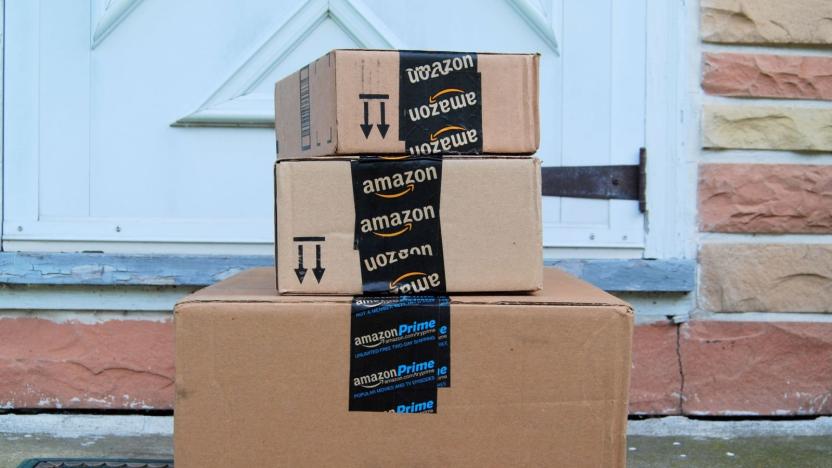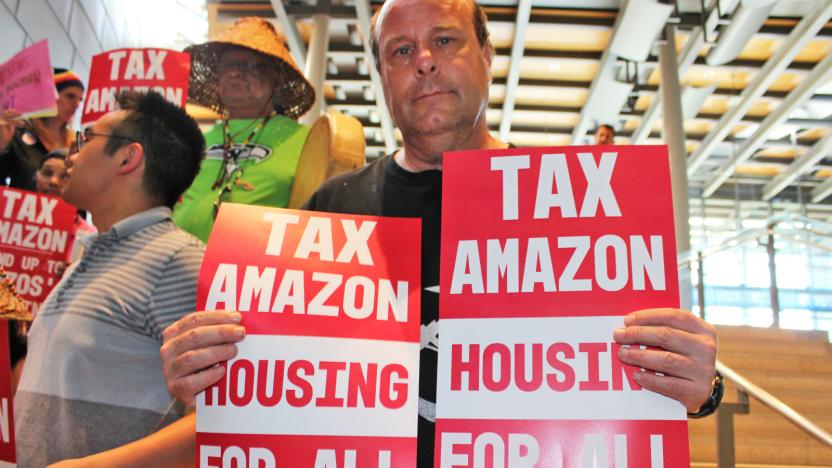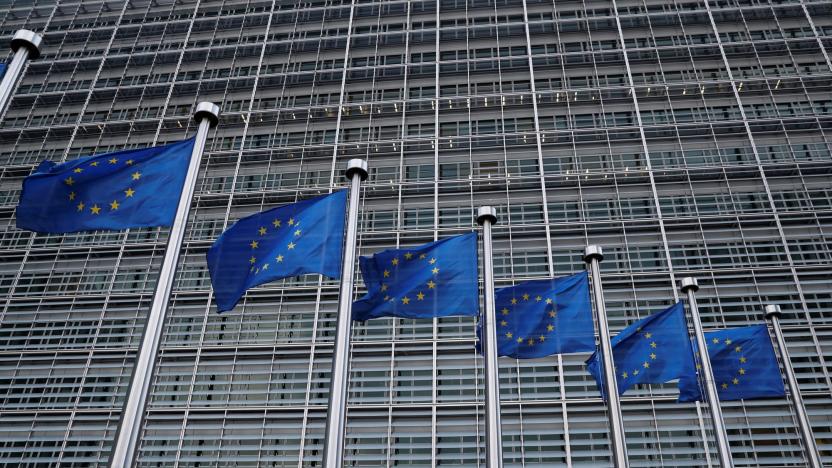tax
Latest

G20 countries agree to close tax loopholes for tech companies
Tech giants are already finding themselves on the hook for more taxes in parts of Europe, but there could now be a much more coordinated effort to have them pay up. Reuters says it has obtained a Group of 20 draft communiqué revealing an agreement to establish "common rules" for closing tax loopholes used by companies like Amazon, Apple, Facebook and Google. While the specifics haven't been nailed down, it would involve a "two-pillar" approach that both divides the rights to tax companies where products are sold (not just where they have offices) and a minimum tax rate.

California considers a texting tax
Cell phone owners in California could soon pay extra for the privilege of sending text messages, thanks to landline-era legislation and changing usage patterns. According to recent public law filings, the state's Public Utilities Commission (PUC) is considering a plan that would bill users a monthly fee for any text message services they use, and phone service carriers aren't happy about it.

Germany calls for global minimum tax on large tech companies
German Finance Minister Olaf Scholz has called for a global minimum tax on large technology companies, The Telegraph reports, and it's a move aimed at ensuring tech firms pay taxes in the countries in which they generate revenue rather than only in the countries where they're headquartered. "We need a worldwide minimum tax level that no state may go below," Scholz told Welt am Sonntag. "We require coordinated mechanisms which prevent the displacement of revenues to tax havens."

The Senate is considering extending EV tax credits
As US senate majority leader Mitch McConnell debates making cuts to social security and medicare, Senator Dean Heller (R) of Nevada is hoping to keep electric car sales zipping forward with a new bill that would extend tax credits until 2022.

Illinois governor vetoes bill that would stifle car sharing
Illinois Governor Bruce Rauner has vetoed a bill that stood to damage peer-to-peer car sharing companies like Turo, GetAround and Maven. The bill was passed by the state legislature in May and would have applied the same state and local taxes big rental companies like Avis or Hertz have to pay to the individuals that rent out their vehicles on the car sharing platforms. Those include a five percent tax as well as local taxes of up to 20 percent. While the bill didn't initially include such stipulations, Ars Technica reports that industry lobbyists pushed for the changes late in the process.

Harleys sold in the US will still be built in the US
This morning I rode an electric motorcycle to work. It was quiet, clean, quick (lane-splitting FTW), and in San Francisco's increasingly horrid traffic, it was more enjoyable than sitting in a car staring at the license plate in front of me for 30 minutes while moving only three blocks.

Supreme Court ruling lets states collect sales tax from online purchases
It's not unheard of for internet retailers to collect sales tax regardless of where their customers are located, but they might not have much choice before long. The US Supreme Court has ruled that states can force online stores to collect sales tax, reversing a 1992 precedent that let companies avoid sales tax when they didn't have a physical presence. South Dakota (with the support of 41 other states, two territories and DC) had taken action against Newegg, Overstock and Wayfair after enacting a tax collection law in 2016, arguing that the presence rule was "arbitrary." The state put enforcement of the law on hold until it could definitively establish that it was constitutional.

Amazon Prime is now available in Australia
Amazon launched its Prime service in Australia today, giving most Australians access to free two-day shipping, Prime Video and a number of other perks. A subscription will cost AU$59 (approximately $44) per year -- as opposed to the US price of $119 -- a discounted rate that takes into account a smaller selection of goods and higher prices. Amazon just launched in the country last December.

Seattle quickly repeals 'head tax' that Amazon opposed
Just a few weeks after enacting a so-called "head tax" Seattle's City Council voted 7-2 to repeal it. It would have charged big businesses around $500 for each of their full-time employees in order to fund affordable housing and services for the homeless, but facing opposition from corporations like Amazon, local politicians blinked. According to GeekWire, Councilwoman Lisa Herbold said the repeal vote happened because "This is not a winnable battle." Amazon had paused work on a new HQ in the city after the original proposal came up, but resumed construction after a compromise dropped the fee to $275 per employee. Forces against the levy (including Amazon and Starbucks) were funding a "No Tax on Jobs" campaign to put its fate on the ballot in November, and the Council believed it did not have the resources to win. In a statement, Amazon exec Drew Hardener said: "Today's vote by the Seattle City Council to repeal the tax on job creation is the right decision for the region's economic prosperity...We are deeply committed to being part of the solution to end homelessness in Seattle and will continue to invest in local nonprofits like Mary's Place and FareStart that are making a difference on this important issue."

Amazon resumes HQ expansion after Seattle tax compromise
Amazon has graciously resumed construction work in Seattle after the City Council "compromised" on a controversial tax that will see the tech giant -- that turned over $51 billion in sales during the last quarter alone -- on the hook for $11 million annually. A sum that will be used to tackle the city's homelessness issue.

IRS' direct online payment system goes down on tax day (update: resolved)
We hope you weren't relying too heavily on internet payments to file your taxes on time. The Internal Revenue Service's Direct Pay system failed (and is still unavailable as we write this) on April 17th -- you know, the last day before the tax filing deadline. You can still pay online with a credit or debit card, but that entails a transaction fee. Otherwise, you're looking at old-school checks.

EU proposes strict new taxes on large technology companies
The European Commission has unveiled radical measures to better tax technology companies with large operations in its member states. The first proposal would allow countries inside the EU to effectively tax profit that is created inside their borders, regardless of whether the business in question has an office there. Under this rule, a company would be eligible for taxation if it had more than 100,000 users, earned more than 7 million euros annually, or over 3,000 "business contracts for digital services" inside the country. The Commission hopes this would stop companies from re-routing revenue to countries with more favourable tax laws.

EU details its taxes on tech companies' revenue
The European Union has vowed to counter tech companies' tax maneuvers by targeting their revenue, and it's now clearer just what that will involve. In an interview with Le Journal du Dimanche, French Finance Minister Bruno Le Maire said the EU would unveil plans to tax tech firms' revenue at a rate between "2 percent and 6 percent," most likely skewing closer to 2 percent. That may not seem like much, but Le Maire portrayed it as a "starting point." It's better to get a policy you can implement quickly than deal with "interminable negotiations," he said, adding that it can be improved later.

India wants to collect taxes from its cryptocurrency investors
India's income tax department has sent notices to tens of thousands of people dealing in cryptocurrency, after learning that $3.5 billion worth of transactions have been conducted over a 17-month period. The move comes as India's finance ministry grapples with regulations for virtual currencies, which are attracting around 200,000 users and raking in 20 billion Indian rupees ($315 million) worth of trade per month, reports Reuters.

Apple plans to add 20,000 jobs, new campus in the US
Apple is determined to show that it's investing in the US economy despite its tax moves and foreign manufacturing. The company has announced a slew of investments it claims will pump a total of $350 billion into the US economy, highlighted by its focus on (what else) jobs. It expects to spend $30 billion in capital expenses that will create more than 20,000 new positions over the next 5 years, both at its existing buildings and a new location (to be unveiled later in 2018) that will initially focus on tech support.

South Korea may ban cryptocurrency trading amid fears of tax evasion
In a move that's sent bitcoin spiralling, officials in South Korea have announced plans to ban cryptocurrency trading in the country, though it would take time before such a ban in implemented. The plans come against a backdrop of concerns regarding tax evasion, as cryptocurrency trading in the country is highly speculative and similar to gambling. Many currencies, such as bitcoin and ether, are priced much higher in South Korea's exchanges than elsewhere in the world. Industry data provider CoinMarketCap has even begun excluding some South Korean exchanges in its calculations "due to extreme divergence in prices from the rest of the world".

HMRC stings Apple with £136 million bill for back taxes
Tech giants are often criticised for using complex tax loopholes to bank more of their profits than arguably they should, but occasionally the authorities do manage to find fault in their accounts. Following "an extensive audit" of Apple's books, HM Revenue & Customs scored itself an additional £136 million in back taxes, plus interest, from the company. The Financial Times spotted the payment in the financials of Apple Europe, a UK subsidiary that performs sales support, marketing and other duties for other Apple subsidiaries. According to the FT, HMRC reasoned that Apple Europe did not receive appropriate commission for sales leads from an Ireland-based subsidiary over a number of years up to 2015. Less commission, less taxable income... you get the idea.

Google used a popular tax trick to shelter $19.2 billion
Just how much money do tech companies shelter from taxes? Quite a lot, according to the Dutch. Newly published Netherlands regulatory filings show that Google shielded €15.9 billion (about $19.2 billion) in 2016 using the popular "Dutch Sandwich" tax trick, saving it about $3.7 billion in taxes. The maneuver involves shifting revenue from an Irish subsidiary to a Dutch firm with no staff, and promptly moving the funds to a Bermuda mailbox owned by another Ireland-listed company. And this practice isn't slowing down -- Google moved 7 percent more cash through this approach in 2016 than it did a year earlier.

UK may tax internet giants to get more help fighting online extremism
The UK still isn't convinced that internet giants are doing enough to curb online extremism, and it's now considering hitting those companies where it really hurts: their bank accounts. In an interview with the Sunday Times, security minister Ben Wallace said the country should use taxes to either incentivize stronger anti-extremist efforts or compensate for "inaction." While Wallace didn't go into detail as to what he'd like, the Times suggested it would be a windfall-based tax that targeted companies' large profits.

Coinbase must share users' cryptocurrency data with the IRS
Coinbase will be forced to share the financial information of 14,355 users with the Internal Revenue Service (IRS), following a California federal court ruling. The move follows a year-long battle between the cryptocurrency company and the IRS, which believes a high number of customers are failing to report holdings on their taxes. Coinbase has some six million users, but fewer than 1,000 have officially declared cryptocurrency activity.







